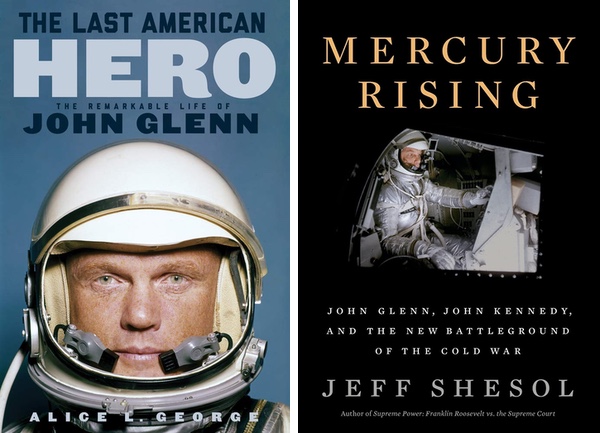Reviews: Examining the life of John Glennby Jeff Foust
|
| “John Glenn returned to Earth as something more than a marine lieutenant colonel: he wore the aura of an American star,” one author writes. |
But just because someone is famous doesn’t mean that they’re well understood. Glenn became famous for his spaceflight—he already had a touch of fame a few years earlier by setting a transcontinental speed record—because of not just his courage and prowess, but also because he was the ideal American symbol of that Cold War era: the ultimate God-fearing family man of humble origins. But what drove him to take those risks, be they in aerial combat or spaceflight or even political campaigns?
One new biography of Glenn, The Last American Hero, sounds from its title like hagiography, even as the author assures us that’s not the case. “This biography does not strive to place Glenn on a pedestal,” Alice L. George, a historian, writes in the prologue, ensuring that she’ll note that he was “flawed like all of us.”
The book, though, doesn’t dwell much on any flaws it finds in Glenn, offering instead a straightforward and very positive account of Glenn’s life. “John Glenn returned to Earth as something more than a marine lieutenant colonel: he wore the aura of an American star,” she writes of Glenn’s experience immediately after his Mercury flight. It does offer a more level-headed examination of his later political career where he proved to be a competent senator despite not being a good politician, as demonstrated by his failed 1984 presidential bid and what Walter Cronkite called “one of the world’s worst speeches” at the 1976 Democratic National Convention, dashing any chances of being selected as Jimmy Carter’s running mate.
Mercury Rising focuses on one aspect of Glenn’s life, his time as a Mercury astronaut. Glenn’s career up until that point, and his post-NASA life, are condensed into the book’s opening and closing sections, using Glenn’s time as an astronaut as a vehicle for examining the early Space Race between the US and USSR.
That closeup examination of Glenn’s astronaut career doesn’t reveal any great new insights, but like another recent book on the early Space Age, Beyond (see “Review: Beyond”, The Space Review, June 1, 2021), offers a compelling narrative and drama leading up to the three-orbit flight of Friendship 7, even if we all know the outcome of the journey.
| Glenn had forgotten to flip a switch added fairly late in the capsule’s design. “The hero was human,” one engineer reflected. |
It also reveals, perhaps better than a generic biography, what drove Glenn: a desire to be in the action. It dated back to his time as a young World War II pilot, impatiently awaiting his chance to get into battle, as well as a few years later, sending requests to be assigned to Korea during the Korean War so frequently he was ordered to stop. (Once there, he flew with an intensity long remembered by fellow pilots; his wingman, the great baseball player Ted Williams, later said of Glenn, “The man is crazy.”) So it was particularly disheartening for him to be told in January 1961 that he would back up Alan Shepard and Gus Grissom in their Mercury suborbital flights, a pain exacerbated by the fact that the decision was kept secret until shortly before Shepard’s flight, with the media continuing to report in the interim that Glenn was the frontrunner.
Glenn, though, backed up that desire to be in the flight with excellent skills as a pilot and an astronaut, be it shooting down three MiGs in the final days of the Korean War or flying the Mercury capsule nearly flawlessly on its first orbital flight, even as ground controllers fretted about a signal erroneously suggesting the capsule’s heat shield was loose. (A steady drift in the capsule’s orientation that Glenn had to manually correct for—given as evidence of the importance of having a person at the controls—turned out to be human error: Glenn had forgotten to flip a switch added fairly late in the capsule’s design. “The hero was human,” one engineer reflected.)
Heroes are human, of course, but contrary to the title of George’s book have not disappeared. “Sadly, the selflessness that John Glenn displayed” in his career, she writes, “has become an almost alien concept in twenty-first-century America.” The pandemic revealed plenty of heroes (and perhaps a few villains as well), each with different achievements, skills, and motivations. Heroism, on the ground or in space, is not lost, even if it is remembered and celebrated differently.
Note: we are using a new commenting system, which may require you to create a new account.
